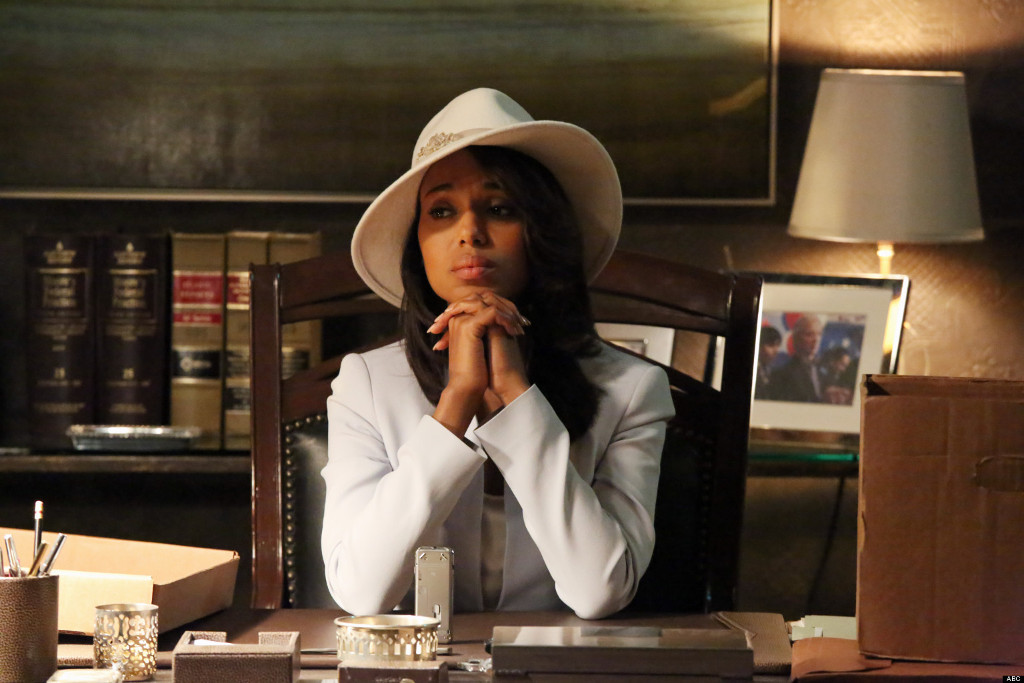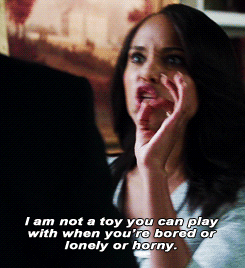Why Is Australia Ignoring The Most Buzzworthy Show On American TV?
It's a massive hit in the US, but Scandal can't catch a break locally.

Okay, so it’s not Breaking Bad. And, at times, its far-fetched plotlines would make Jack Bauer’s writers blush. But the gloriously soapy, frequently ludicrous world inhabited by the US political thriller Scandal is eminently watchable. In fact, it might just be the most addictive show on television.
In this ‘golden age’, where the best and most noteworthy shows more often than not originate from prestige cable networks, Scandal stands apart because it airs, almost shockingly, on the US free-to-air channel, ABC. But thanks to its binge-worthy credentials — plenty of cliffhanger episodes and melodramatic storylines — Scandal has become that rare thing in the US: a free network series that continues to grow its audience with each season.
The season two finale, which aired back in May, drew the show’s largest-ever audience. That was, until the third season premiered in America the other week and drew a huge 10.51 million viewers (and a viral parody from Orange Is The New Black‘s Taystee and Crazy Eyes), up a whopping 71 per cent from its second season premiere.
A hit in the US, a flop in Australia
How popular is Scandal in the US? When ABC announced that the drama Lucky 7 would be the first show cancelled from the US fall TV season line-up last week, Scandal re-runs were instantly thrown into that show’s vacant timeslot. Also, Bill Clinton, Lena Dunham, Mary J Blige and Oprah are all fans.
Yet in Australia, the show is almost an afterthought. Worse than that, since returning to the Monday night airwaves on Channel Seven a couple of weeks back, it’s become an outright flop. Last Monday, the show attracted just 521,000 viewers, which was down from the already low 605,000 the week before. It’s safe to suggest it won’t last in that timeslot. The failure of Scandal in Australia is baffling on many levels, particularly when you consider the blockbuster status we give its similarly glossy and equally preposterous network stable mate, Revenge.
The red-hot American buzz around the series is augmented by Scandal’s penchant for breaking television taboos. To begin with, it is the first Shonda Rhimes (creator Grey’s Anatomy and Private Practice) show that any male can credibly admit to enjoying. But most notably, it shatters a rather big barrier: that a female African-American actress can lead a network drama series. And the luminously OTT Kerry Washington, as political fixer Olivia Pope, leads the series with aplomb.
The success of the politically active actress in the series has provoked discussion among academics and fans about whether it signals a postracial era of television, where race and/or ethnicity matter less overall than the actual character. Along with race, though, the show has also found itself debated along lines of class and gender. “Race is a very big part of who Olivia Pope is, but it’s not dealt with in an obvious way,” said Washington, in an interview last weekend. “I wasn’t even thinking about race or the fact that I’d never seen an African-American woman as the lead of her own network show, but I knew that this smart, sophisticated, powerful and vulnerable woman was a tremendous opportunity.”
Conspiracies, political intrigue, and steamy White House affairs
If you haven’t seen the show, it focuses on the devious, impeccably tailored Ms Pope, a former White House communication advisor, and her motley crew of lawyers, fixers and techno spies. Pope is said to be inspired by a real Washington operative named Judy Smith, who worked for the George H. W. Bush administration before becoming a crisis manager who represented Monica Lewinsky.
Scandal is split into two parts. There is an overreaching conspiracy to which Ms Pope may or may not be a part of (no spoilers here), and then there’s the ‘case of the week’ element of the show, in which Pope represents and solves the problems of some fictional Lewinsky types, while also occasionally conducting an increasingly discrete affair with the President himself.
I’m trying as hard as I can not to suggest that Scandal’s failure locally raises an uncomfortable question as to whether Australian audiences reject the show due to its black female lead (although the fact that Revenge — led by a white, blonde and conventionally attractive actress — is more popular does add a tiny bit of weight to that theory). Most likely, Scandal’s flop status can be denoted by what’s been some questionable programming: it finished airing last year at the far-from-prime time of 10.30pm Mondays, and has spent long stretches on hiatus before only just returning to air.
While I wouldn’t advise you to track down every top-rating US show (hello, Duck Dynasty), the fact remains that with a few minor exceptions, even the higher quality US series have been on the nose ratings-wise at home of late. Even Homeland began with respectable Australian numbers, but has rated poorly this year. The Good Wife, another excellent US drama, is struggling on Ten. And substandard but well-rated-in-the-US shows such as Castle, Bones and Elementary don’t really do the business in Aussie anymore.
But Scandal, a frothy guilty pleasure if ever there was one, should be different. At the very least, if only for Washington’s exceptional couture and insider White House gags, it deserves a chance.
–
Scandal Season Two airs on Network Seven on Mondays at 9:30pm, or catch-up on episodes at Plus7.
–
Andrew Murfett is a Melbourne-born writer and editor based in Miami. He has written for The Age, The Sydney Morning Herald, The West Australian, Faster Louder, Crikey and AAP. You can read more musings @amurfett
